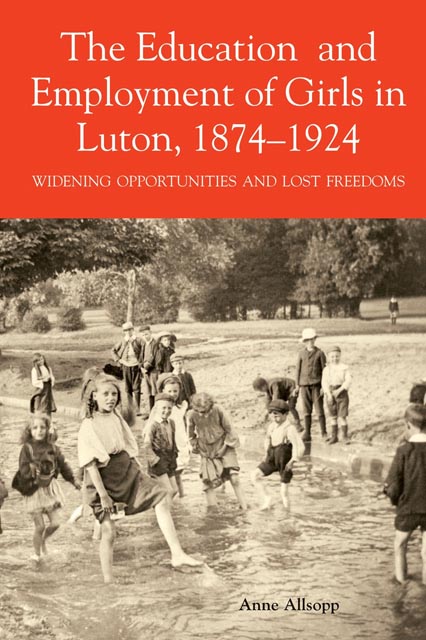Book contents
- Frontmatter
- Contents
- List of Illustrations
- List of Tables
- Dedication
- Acknowledgements
- Abbreviations
- Introduction
- Chapter One Luton: Scientiae et labori detur
- Chapter Two Further Perspectives Concerning Employment Patterns for Women
- Chapter Three Sunday Schools
- Chapter Four Education in the Time of the School Board
- Chapter Five Teaching: An Alternative Occupation
- Chapter Six Teacher Training and the Education of Students Aged Over Fourteen Under Bedfordshire County Council
- Chapter Seven Elementary Education 1903–1924
- Chapter Eight Rural Schools
- Chapter Nine Learning and Living
- Chapter Ten Secondary Education for Girls
- Conclusion
- Appendix
- Bibliography
- Index
Chapter Four - Education in the Time of the School Board
Published online by Cambridge University Press: 03 August 2023
- Frontmatter
- Contents
- List of Illustrations
- List of Tables
- Dedication
- Acknowledgements
- Abbreviations
- Introduction
- Chapter One Luton: Scientiae et labori detur
- Chapter Two Further Perspectives Concerning Employment Patterns for Women
- Chapter Three Sunday Schools
- Chapter Four Education in the Time of the School Board
- Chapter Five Teaching: An Alternative Occupation
- Chapter Six Teacher Training and the Education of Students Aged Over Fourteen Under Bedfordshire County Council
- Chapter Seven Elementary Education 1903–1924
- Chapter Eight Rural Schools
- Chapter Nine Learning and Living
- Chapter Ten Secondary Education for Girls
- Conclusion
- Appendix
- Bibliography
- Index
Summary
Before 1870, elementary education in Luton was provided by the National and British Societies and in dame or private adventure (small independent) schools. A few respectable establishments offered higher levels of education, but the market for these was small. However, the passing of the 1870 Forster Education Act forced the town to confront the situation. This Act required local authorities to assess the number of elementary school places available and, if there was a shortfall, to ‘fill up the gaps’.
The possibility of an elected body having a say in what local children were taught angered members of Luton churches who firmly believed that education was their responsibility. Dony explains how bad feelings on this subject date back to 1834 when the government offered grants towards the building of new schools. The National and British Societies both wanted a school in Luton, but the number of children to be taught allowed for only one grant and that went to the National Society. ‘The die was cast for a dispute that was to disturb the peace of Luton for seventy years.’
Dony, referring to the Forster Act, says that ‘it would have been impossible to have drafted any Act of Parliament to give more trouble to [mainly Nonconformist] Luton’. A vestry meeting was called, possibly ‘the most disgraceful meeting ever held in the town’. The Church promised to build new schools and to provide a sufficient number of places, thereby warding off government interference. Their opponents, led by the treasurer of the British School, wanted a poll which, it was hoped, would support the establishment of a School Board. Some of the points made against the Board system were that it was a ‘leap in the dark’, that once you have a Board you cannot get rid of it and that there was already a burden of taxation. There was also a fear that educating children with public money would lead to feeding and clothing them as well.
Arguments for a Board were that it would provide and secure the education of the ‘entire population … calculated to promote the moral and material well-being of the Working Classes – to fit them for higher spheres of usefulness, to give them a “fair start in life”, and to enable them the better to make their way in the world’. The education which it would provide would be ‘free from all denominational teaching’.
- Type
- Chapter
- Information
- The Education and Employment of Girls in Luton, 1874-1924Widening Opportunities and Lost Freedoms, pp. 62 - 92Publisher: Boydell & BrewerFirst published in: 2023



